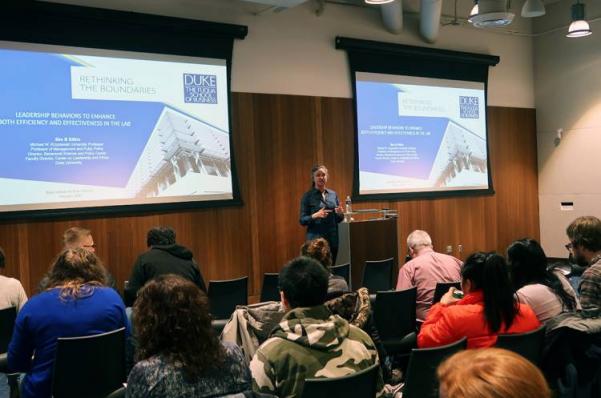Confronting Power Dynamics in Academia

Katie Dickerson wanted someone to talk to as she navigated the transition from postdoc to assistant professor in Psychiatry & Behavioral Sciences at Duke. A supportive sounding board for her questions about gender, equity, and other issues would be nice, she thought. Back in her grad student days, a book club geared toward women in science served as a safe space for candid discussions.
Dickerson asked her colleague Shabnam Hakimi, postdoctoral scholar at the Duke Institute for Brain Sciences (DIBS), to collaborate on a new book club they dubbed SPEAK (Scientists Promoting Equity and Knowledge). Before long, the group had plenty to talk about.
In close succession, two high-profile lawsuits regarding incidents in other universities’ brain sciences departments came to light. The allegations of sexual misconduct, harassment and gender discrimination were deeply disturbing.
“There was a lot of pain in our community regarding these issues,” Dickerson recalls, “and I felt a tremendous amount of urgency to do something to address people’s needs.”
Hakimi was also concerned. “People in our community started sharing things with me, and I felt pangs of empathy and anger.”
Drawing on their positive experience with the book club, they sought to provide an opportunity for the wider community to come together and talk about these issues.
Broader Than Gender
Nicole Schramm-Sapyta, associate professor of the practice at DIBS, helped convene an event with a number of faculty who volunteered to participate. Alison Adcock, Lindsey Glickfeld, Katherine Heller, Jennifer Groh, and Gregory Samanez-Larkin initiated a discussion about gender and sexual harassment that quickly expanded to other issues.
Faculty, postdocs, graduate students and staff brought up a range of concerns, from feeling oppressed by hierarchical relationships and helpless to effect change, to possible repercussions from coming forward. A number of postdocs and students thought their earlier complaints had been ignored.
“The room was full and people were spilling out of the door,” Hakimi remembers. “We were unprepared!” The one-hour event stretched to two.
Melissa Segal, senior business manager in the Neurobiology Department, was standing in the back. “I was floored by the number of people who came, and the amount of excitement people felt about having this conversation,” she says. “It became clear that this was about so much more than gender—it was about inclusion across the board and about power dynamics and feeling safe.”
Immediately afterward, Segal connected with Dickerson, Hakimi, and Schramm-Sapyta “in hopes that we could partner to look into these issues more broadly and to provide a space to address them.”

Forming a planning committee along with Lamercie Saint Hilaire, assistant professor in Family Medicine & Community Health, they visited leaders across campus. The group identified training resources and started developing a series of programs on diversity, inclusion and the power dynamics of a research environment.
Institutional Support
Duke’s Office of the Vice Provost for Faculty Advancement awarded a seed grant for the group to take this project forward. Faculty Advancement Seed Grants provide a financial head start for novel faculty-led initiatives that aim to foster a sense of community, build networks and promote a respectful climate for all members of Duke’s academic units.
The seed grants program is part of Duke Faculty Advancement’s multifaceted approach to faculty development and advancement. The office’s goals are to support hiring and retention, to provide resources and programs to help faculty succeed as scholars and mentors and to foster a welcoming and professional environment.
“Everyone in that office has been so supportive,” Dickerson says. Funding was renewed for a second year.
Hosted by DIBS with support from Neurobiology and Psychology & Neuroscience, the workshops have taken on topics such as dealing with unprofessional behavior, difficult conversations, resources to combat harassment, bullying, working with diverse groups, implicit bias and unrealistic work expectations.

Freedom to Be Honest
Schramm-Sapyta makes the point that DIBS is a natural convener for this work. “We don’t have departmental authority over any of our meeting attendees,” she notes. “We’re not granting tenure or conferring Ph.D. degrees, so there is more freedom to be honest in our meetings.”
At the same time, not everyone feels comfortable discussing power dynamics with those who wield authority. “Students and postdocs expressed interest in having their own space and opportunities to talk without faculty present,” Hakimi says. “So we’ve done some sessions only for them. We’re mindful that everyone has unique needs.”

Creating a Structure for Change
So far, participants include more than 450 individuals from 65 departments, institutes, and centers. Going forward, the group hopes to build a more formalized mentoring program, drawing on the knowledge they’ve gained.
“From what we’ve learned, it’s increasingly clear we need institutional change and enforcement,” Hakimi says. “It’s nice to see that people who do have power are willing to listen and engage.”

“I’ve been surprised by the degree of hurt expressed by members of our community, their candor in sharing their stories, and their hope for improvement,” Schramm-Sapyta reflects. “When someone expresses something that doesn’t fit with what I believe, or with the data, I’ve learned to remind myself to make that person feel valued. How will we effect change if we only speak to those who already agree?”
Besides, she notes, “when all ideas can be heard and when people feel safe and included, we are all more productive!”
Learn more about the Faculty Advancement Seed Grants Initiative and check out the Faculty Advancement and Success (FAS) Workshop Series, which provides learning opportunities, resources and networking for all faculty at Duke. Read about Nicole Schramm-Sapyta’s addiction research in the Duke School of Medicine’s Magnify Magazine.
